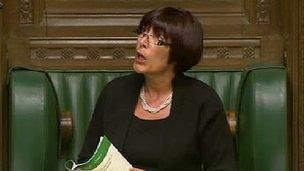Busted!
- Published
- comments

The deputy speaker issues her reproof...
Busted! The Conservative MP David Nuttall has just been caught out by eagle-eyed deputy speaker Dawn Primarolo.
He's one of the hit-squad of backbench Tories who specialise in killing off private members' bills, by making long speeches and using up the available debating time, so that the bills are not put to the vote - votes only occur if the debate comes to a natural end, with everyone who wants to speak having spoken, or if 100 members vote in favour of closing the debate.
As he moved past the one hour mark in his speech on Barbara Keeley's Social Care and the Identification of Carers Bill, the deputy speaker said she had been able to follow his speech by reading a House of Commons library research paper - which would put him on the wrong side of Standing Order 42. She hoped she wouldn't be able to read his next remarks first, in that document. An abashed Mr Nuttall said he had drawn on what he called an extremely useful document….and a little later, after one hour and six minutes of exquisite tedium, he drew his remarks to a close.
Tricks of the trade like this are often deployed by one side or the other to talk out some unwelcome bill. One Labour specialist in this activity would wait for a changeover in the chair, and then re-read an earlier page of his speech, secure in the knowledge that the deputy speaker who had taken over would not have heard it. Tee hee.
While it is easy to condemn such japes, the point is that private members' bills are, quite deliberately, made vulnerable to procedural tricks. Imagine what horrors might make it onto the statute book if, what one Commons authority venomously described to me as "MPs' pet schemes for the betterment of humanity", could be voted through a virtually empty chamber, when no-one was looking. Law making ought to be difficult and should not be possible without broad support, or without a large group of members willing to give up their time to support it….
Barbara Keeley's ambitious and far-reaching bill to help carers looking after someone who was ill or disabled, clearly addresses an important issue - but with fewer than 20 MPs in the chamber, it was always likely to die this way.
And she spent much of the debate seeking assurances from ministers that they would take up the points she had made in their own forthcoming bill.